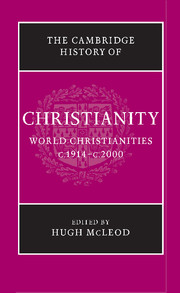2 - Being a Christian in the early twentieth century
Published online by Cambridge University Press: 28 March 2008
Summary
Christendom
Limerzel is a large village in the Morbihan department of western France. In the first half of the twentieth century most of the population were employed in agriculture and the overwhelming majority were churchgoing Catholics. Its reputation for devotion was such that Catholic journalists referred to it as ‘the pearl of the diocese of Vannes’. The rector was the most powerful figure in the village and he was accustomed to wielding the big stick. Children were brought up from an early age to realise that the clergy were special. When a priest visited, the adults showed respect and the children were afraid. In 1962, concerned at a relatively small decline in churchgoing, the rector was still warning in the parish bulletin: ‘The presence of man here below has no other reason than preparation for eternal salvation of which the Church has received charge.’ Religious symbols were prominent in the home, as well as in the village and the surrounding countryside.
The weekly mass, from which in the 1930s only ‘one or two’ villagers were said to be regularly absent, was a central event in the weekly cycle. News was exchanged on the church steps, and bereaved families then headed in a group to the cemetery, while men gathered in the bar. Processions, pilgrimages and the various church festivals were major events in the annual cycle.
Nearly everyone was educated in a Catholic school. In fact the state school, popularly known as ‘the devil’s school’ or ‘the school for dogs’, was only saved in the 1920s by the secret intervention of the rector, who persuaded a family to transfer their children to the secular establishment.
- Type
- Chapter
- Information
- The Cambridge History of Christianity , pp. 15 - 26Publisher: Cambridge University PressPrint publication year: 2006
References
- 1
- Cited by



